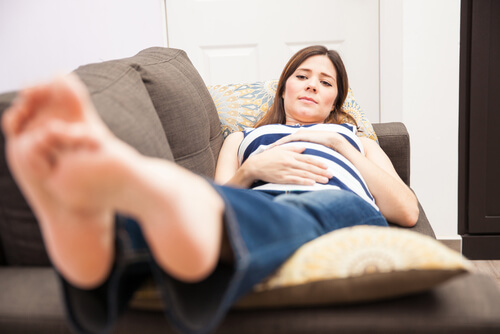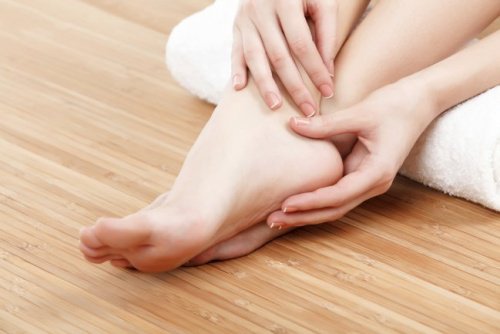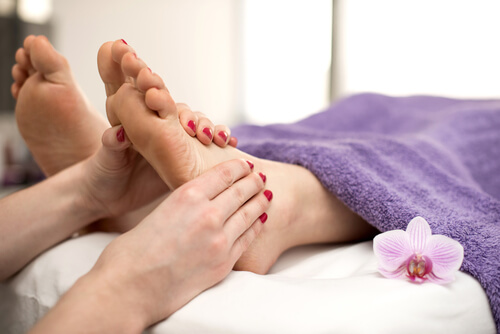Swollen Feet during Pregnancy: Remedies to Prevent Pain

Swollen feet during pregnancy is a common problem. Generally, the feet are aggravated in the last trimester due to an accumulation of fluid in the tissues.
Next, we’ll see why we experience swollen feet during pregnancy and the different ways we can remedy the pain.
Swollen feet during pregnancy: is it normal?
Suffering from swollen feet in pregnancy is a common ailment. Weight on the legs and feet, and discomfort when walking are obvious signs of fluid retention.
This inflammation in the lower extremities occurs with greater incidence in the last months of pregnancy.
All this happens because of the baby’s weight. The uterus, larger at this stage, exerts pressure on the pelvic veins, slowing circulation accordingly.
The swelling of feet during pregnancy is a frequent discomfort due to weight gain and fluid retention during the last months of pregnancy.
Why do the feet swell during pregnancy?
Swollen feet in pregnancy appear due to an excessive accumulation of fluid in the tissues due to changes in the properties of the blood.
In these months, the amount of water in the body increases due to the effect of hormones, stimulating fluid retention. This excess is deposited in the ankles and feet, causing the usual discomfort and the sensation of heaviness.
In addition, there is a greater blood flow that can cause the blockage of some veins. The greater amount of water in the body produces resistance and increases blood pressure.
Also, by increasing in size, the uterus presses the pelvic veins, which transports blood from the extremities to the heart. The pressure from the uterus slows down the circulation and leads fluid from the veins to be retained in the extremities.

Ways to prevent swollen feet during pregnancy
Although healthy women don’t usually suffer from swollen feet during pregnancy, it’s not unusual for it to appear.
In addition to the causes indicated, a sudden increase in weight during pregnancy or maintaining inadequate body posture favors its appearance. It’s good to avoid a sedentary lifestyle and sources of heat, as this increases the chances of inflammation.
Recommendations to avoid swelling:
- Drink a lot of water. Between 8 and 10 glasses a day are recommended. This eliminates toxins from the body and prevents fluid retention.
- Take care of your diet. It’s essential to eat enough fruits and vegetables and to avoid processed foods and salt.
- Perform physical exercise. Being sedentary is the worst enemy for swollen feet in pregnancy. Therefore, it’s ideal to perform moderate exercise that activates circulation. Walking, yoga or water exercises are the most advisable.
- Avoid being in the same position for a long time. Spending many hours sitting or standing is not good. Instead, it’s important to move, get up and take some steps. Likewise, it’s good to place your legs on a higher stool and to never cross your feet and legs while sitting.
- Stretch your legs forward and bend your ankles upward to stretch your muscles.
- Wear comfortable shoes and special pregnancy socks.
- Try foot baths with cold or hot water. It’s recommended to do this at the end of the day as a way to relax. Add hot water and salt in a bowl. If you prefer cold water, incorporate ice and submerge your feet for a few minutes. This will calm the swelling and activate circulation.
- Relaxing massages. A tip to calm the sensation of swelling is to perform massages in the area. Caring for your feet with moisturizing creams and gentle circular massages stimulates circulation.
- Lie on your side. This will help relieve the pressure on the veins.

What should you pay attention to?
As we have seen, swelling in the feet, legs and ankles is common during the last months of pregnancy. However, it must be taken into account to what extent it is normal and when it’s necessary to resort to a specialist.
In case you notice that any of the situations described below are presented, immediately call your doctor:
- In addition to the lower extremities, your face, hands and the area around your eyes may swell.
- Exaggerated or sudden swelling of the feet.
- Prolonged swelling, even if you’ve taken the precautions described above.
- If one leg is more swollen than the other or some pain arises.
Remember that it’s usually a regular and temporary discomfort. Therefore, it’s not necessary for you to worry excessively. In principle, it will be enough to follow the suggested recommendations.
All cited sources were thoroughly reviewed by our team to ensure their quality, reliability, currency, and validity. The bibliography of this article was considered reliable and of academic or scientific accuracy.
- Bunce E. E, Heine R. P. Hinchazón en el último trimestre del embarazo. Manual MSD. Junio 2021.
- Buttler Tobah Y. ¿Cuál es la causa de la hinchazón en los tobillos durante el embarazo? ¿Qué puedo hacer al respecto? Mayo Clinic. Agosto 2020.
- Smyth RM, Aflaifel N, Bamigboye AA. Interventions for varicose veins and leg oedema in pregnancy. Cochrane Database Syst Rev. 2015 Oct 19;2015(10):CD001066.
- Van Kampen M, Devoogdt N, De Groef A, Gielen A, Geraerts I. The efficacy of physiotherapy for the prevention and treatment of prenatal symptoms: a systematic review. Int Urogynecol J. 2015 Nov;26(11):1575-86.
- Coban A, Sirin A. Effect of foot massage to decrease physiological lower leg oedema in late pregnancy: a randomized controlled trial in Turkey. Int J Nurs Pract. 2010 Oct;16(5):454-60.
